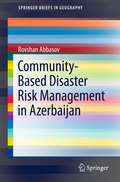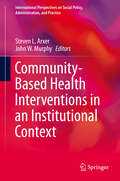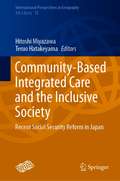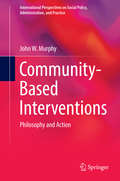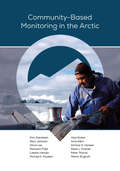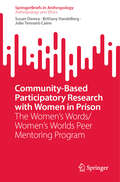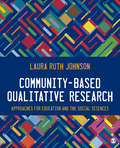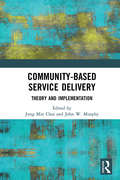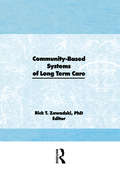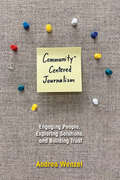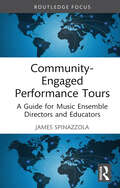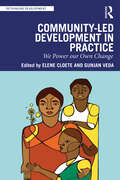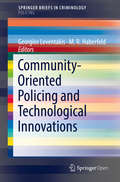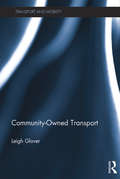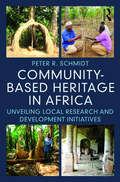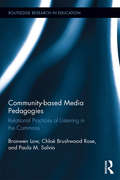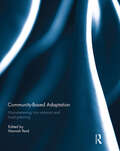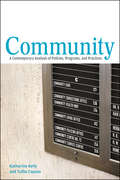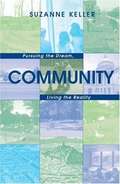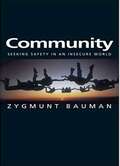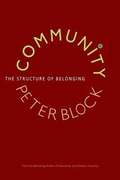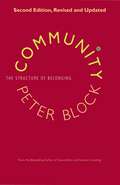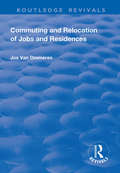- Table View
- List View
Community-Based Disaster Risk Management in Azerbaijan (SpringerBriefs in Geography)
by Rovshan AbbasovThis book illustrates the main factors of vulnerability and gives a clear picture about the possible interventions to reduce disaster risks both in schools and communities in Azerbaijan. A new methodology for child centered vulnerability assessments both on school and community levels has been developed. This methodology can be used to assess the level of vulnerability of schools and communities. The book is a newly prepared training manual which will help practitioners conduct trainings for government and community organizations. While the book is focused on a specific region, the suggested approach is generic and can be used elsewhere.
Community-Based Health Interventions in an Institutional Context (International Perspectives on Social Policy, Administration, and Practice)
by John W. Murphy Steven L. ArxerCommunity-Based Health Interventions in an Institutional Context examines challenges of "institutionalizing" community-based health care. While the community-based or localized model is growing in popularity and importance in the United States, in practice it must often be brought in to larger institutions in order to grow to scale. The typical goals of an institution—standardization, formalization, and control—may be seen as antithetical to those of a community-based healthcare provider, such as spontaneity, customization, and flexibility. The contributions to this work raise questions about how the community-based model can be scaled up through institutions, and how "institutionalization" can be rethought from a bottom-up approach. They provide not only an overview of community-based organizations, but also delve into practical topics such as establishing budgets, training workers, incorporating technology, as well as more theoretical topics like goal-setting, policy effects (like the ACA), and relationships between patient and community. This work will be of interest for researchers interested in exploring the community-based health care model, as well as practitioners in health care and health policy.
Community-Based Integrated Care and the Inclusive Society: Recent Social Security Reform in Japan (International Perspectives in Geography #12)
by Hitoshi Miyazawa Teruo HatakeyamaThis book discusses the building of comprehensive community support systems, which constitutes a key issue in social security reforms in Japan. The book comprises three parts: (I) Mapping Social Security in Japan, (II) Community-Based Integrated Care Systems in Japan, and (III) A Prospect of Community-Based Inclusive Society in Japan. The chapters in this book were composed on the basis of research into community-based integrated care systems and community-based inclusive society, conducted by members of the Association of Japanese Geographers’ Study Group “Regional Issues Related to the Birthrate Decline and Population Aging.” Choosing local governments with different regional characteristics, the authors conducted empirical research to uncover the characteristics of comprehensive community support systems, building processes, and challenges in the respective local governments. Non-Japanese readers will acquire an understanding of the characteristics of social security and the trends of the reforms in Japan. To support its use as a reference book, chapters in Part I include numerous maps and figures with the themes of welfare, medical care, and health levels in Japan.
Community-Based Interventions: Philosophy and Action (International Perspectives on Social Policy, Administration, and Practice)
by John W. MurphyFor decades, community-centered social services have been promoted as an admirable ideal. Yet the concept of decentralized services delivered where people live has proved to be an elusive ideal as well, with the promise of empowerment often giving way to disinterest and apathy. Community-Based Interventions examines the reasons community programs tend to founder and proposes a realistic framework for sustained success. The book's theoretical, philosophical and political foundations begin with the importance of context, as in local knowledge and community self-definition and engagement. Innovative, often startling, approaches to planning, design and implementation begin with the recognition that communities are not "targets" or "locations" to be "fixed," but social realities whose issues require concrete answers. The variety of examples described in these chapters demonstrate the power of community interventions in providing effective services, reducing inequities and giving individuals greater control over their health, their environment and in the long run, their lives. Included in the coverage: Redefining community: the social dimensions. A new epidemiology to inform community work. The role of research in designing community interventions. The conceptual flow of a community-based project. Building autonomy through leadership from below. Relating social interventions to social justice. Attuned to the current era of health and mental health reform, Community-Based Interventions represents a major step forward in its field and makes an inspiring text for social workers, clinical social workers, public health administrators and community activists.
Community-Based Monitoring in the Arctic (Alaska)
by Olivia Lee Hajo Eicken Finn Danielsen Noor Johnson Maryann Fidel Lisbeth Iversen Michael K. Poulsen Ania Albin Simone G. Hansen Peter L. Pulsifer Peter Thorne Martin EnghoffCommunity Based Monitoring Programs in the Arctic explores the concept and use of community-based monitoring (CBM) of ecological conditions in the Arctic. The authors analyze current programs and determines that CBM, while widespread and effective, nonetheless still has untapped potential. Presenting numerous examples and substantial data from a pan-Arctic survey and several workshops around the Arctic, Ths book offers a state of the field and a guide for mapping out the next steps. Contributors include Finn Danielsen, Noor Johnson, Olivia Lee, Maryann Fidel, Lisbeth Iversen, Michael K. Poulsen, Hajo Eicken, Ania Albin, Simone G. Hansen, Peter L. Pulsifer, Peter Thorne, and Martin Enghoff.
Community-Based Participatory Research with Women in Prison: The Women’s Words/Women’s Worlds Peer Mentoring Program (SpringerBriefs in Anthropology)
by Susan Dewey Brittany VandeBerg Julie Tennant-CaineThis innovative work tells the story of a unique partnership between a state prison administration and a team of incarcerated women, prison administrators, researchers, artists, and students known as The WoW Collective due to their joint efforts in developing a peer mentoring program called “Women’s Words/Women’s Worlds (WoW).” Using the example of WoW, the book provides a guide to doing community-based participatory research (CBPR) with women in prison that takes a collaborative—rather than the typically adversarial—approach to working together toward the goal of transformative social change. This book provides a ground-breaking example of how incarcerated women, prison administrators, researchers, and artists successfully worked together on a community-based project that led to meaningful results in the form of a peer mentoring program designed by women in prison for women in prison. Remaining closely attuned to the ethical dimensions of doing CBPR in a highly structured prison environment, this book provides inspiration to CBPR practitioners who seek to work within the criminal justice system to create real and meaningful change for the better. Co-authored by two criminologists, a senior prison administrator, and the unique collective known as WoW, this book provides both a clear step-by-step CBPR guide and a visionary approach to working with criminal justice practitioners.
Community-Based Qualitative Research: Approaches for Education and the Social Sciences
by Laura Ruth JohnsonThis practical text integrates theoretical perspectives with guidelines for designing and implementing community-based qualitative research projects. Coverage of participatory research designs and approaches is complemented by chapters on specific aspects of this research process, such as developing relationships and sharing findings to strengthen programs. Included are useful handouts and templates for applying to the reader’s own projects, and end-of-chapter questions for self-reflection and class discussion. Readers will find the book’s engaging case studies, interdisciplinary real-life examples, and insights from project participants as a helpful foundation for future work in the field.
Community-Based Qualitative Research: Approaches for Education and the Social Sciences
by Laura Ruth JohnsonThis practical text integrates theoretical perspectives with guidelines for designing and implementing community-based qualitative research projects. Coverage of participatory research designs and approaches is complemented by chapters on specific aspects of this research process, such as developing relationships and sharing findings to strengthen programs. Included are useful handouts and templates for applying to the reader’s own projects, and end-of-chapter questions for self-reflection and class discussion. Readers will find the book’s engaging case studies, interdisciplinary real-life examples, and insights from project participants as a helpful foundation for future work in the field.
Community-Based Service Delivery: Theory and Implementation
by Jung Min ChoiThis book takes up the challenge of the failure of most initiatives in community-based service delivery to address the significant philosophical shift that is necessary to create, implement, and evaluate appropriately these sorts of projects. Challenging the tendency to focus entirely on practicalities, the authors emphasize the centrality of philosophy to any successful community-based undertaking. While fully acknowledging the importance of local knowledge and the guidance of projects by local people, this volume shows that these principles are often at odds with the ‘Cartesian’ mindset that underpins much project planning, with its emphasis on objectivity in science and knowledge. Since all knowledge is mediated by human activity and embedded in language and other modes of expression, this dualist approach must be reconsidered. A thorough rethinking of traditional service delivery, which takes into account issues of data, methodology, and bias together with questions of generalizability, community, power, and communication, this book will appeal to scholars of sociology, social policy, and social work with interests in community-based service delivery.
Community-Based Systems of Long-Term Care
by Rick T. ZawadskiAn enlightening review of the successes and failures of several federally funded community-based projects that offered elderly persons an alternative to nursing home care. Policymakers, caregivers, and students of public administration and gerontology must read this valuable book.
Community-Centered Journalism: Engaging People, Exploring Solutions, and Building Trust
by Andrea WenzelContemporary journalism faces a crisis of trust that threatens the institution and may imperil democracy itself. Critics and experts see a renewed commitment to local journalism as one solution. But a lasting restoration of public trust requires a different kind of local journalism than is often imagined, one that engages with and shares power among all sectors of a community. Andrea Wenzel models new practices of community-centered journalism that build trust across boundaries of politics, race, and class, and prioritize solutions while engaging the full range of local stakeholders. Informed by case studies from rural, suburban, and urban settings, Wenzel's blueprint reshapes journalism norms and creates vigorous storytelling networks between all parts of a community. Envisioning a portable, rather than scalable, process, Wenzel proposes a community-centered journalism that, once implemented, will strengthen lines of local communication, reinvigorate civic participation, and forge a trusting partnership between media and the people they cover.
Community-Engaged Performance Tours: A Guide for Music Ensemble Directors and Educators
by James SpinazzolaCommunity-Engaged Performance Tours addresses the role of performance touring as a form of classroom and community engagement. Performance tours have long been a part of the collegiate and high school music ensemble experience, bringing student bands, choirs, and orchestras into connection with a wide variety of audiences, venues, and cultural contexts. This book presents a new approach to the performance tour that integrates touring with community engagement and service-learning. Emphasizing reciprocity, cross-cultural exchange, and global awareness, the author addresses how visiting ensembles can work with host communities instead of performing for them. The book includes student and community perspectives and case studies from the author’s experience leading university wind symphony tours in Haiti and the Dominican Republic, and provides a practical and hands-on model for ensemble leaders and educators.
Community-Led Development in Practice: We Power Our Own Change (Rethinking Development)
by Gunjan Veda Cloete, Edited by EleneIn the last decade, the international development sector has been re-examining its ways of thinking, being, and doing, and we have seen a growing consensus around the need to centre communities in development. However, there is little clarity on what such centring entails and how it can be achieved. This edited volume addresses this gap by highlighting what community-led practices look like and how they compare across different sociocultural and organisational landscapes.Bringing together the work of over 30 international authors, ranging from experienced community-led development practitioners to acclaimed scholars, the book reflects on and critically analyses grassroots initiatives, national-level organisations, and larger-scale international operations. The case studies demonstrate the similarities and differences in community-led practices according to organisational size and spread, while documenting the process of human change that these practices unleash. The volume’s overarching structure reflects the characteristics and processes of community-led development, captured via nine different dimensions: participation inclusion and voice; local resources; sustainability and exit strategies; accountability; responsiveness to context; collaboration (including working with sub-national governments); community-led monitoring and evaluation practices; and facilitation.The book will be of interest to funders, organisations and practitioners looking for non-Western, non-dominant, everyday stories of change. It will also be useful to policymakers, students, and researchers from the fields of community development and international development theory and practice.
Community-Oriented Policing and Technological Innovations (SpringerBriefs in Criminology)
by M. R. Haberfeld Georgios LeventakisThis Brief presents new approaches and innovative challenges to address bringing technology into community-oriented policing efforts. “Community-oriented policing” is an approach that encourages police to develop and maintain personal relationships with citizens and community organizations. By developing these partnerships, the goal is to enhance trust and legitimacy of police by the community (and vice versa), and focus on engaging the community crime prevention and detection efforts for sustainable, long-term crime reduction. The contributions to this volume emphasize how technological innovations can advance community-oriented policing goals, such as: -Strengthening community policing principles through effective and efficient tools, procedures and approaches - Accelerating communication between citizens and police forces - Early identification, timely intervention, as well as better crime reporting, identification of risks, unreported and undiscovered crime through the community Contributions to this volume were developed out of the Next Generation Community Policing (NGCP) International Conference was co-organized by nine contributing research and development projects, funded by the Horizon 2020 SECURITY Program of the European Commission. It will be of interest to researchers in criminology and criminal justice, as well as related fields such as sociology, public health, security, IT and public policy. This book is open access under a CC BY license.
Community-Owned Transport (Transport and Mobility)
by Leigh GloverCity and state governments around the world are struggling to achieve environmentally sustainable transport. Economic, technological, city and transport planning and human behaviour solutions are often hampered by ineffective implementation. So attention is now turning to institutional, governmental and political barriers. Approaches to these implementation problems assume that transport ownership can only be public (owned by state entities) or private (corporate or personal). Another option – largely unexplored to date – is communal ownership of transport.Community-Owned Transport proposes and develops the notion that communal ownership has a historical basis and provides unique opportunities for providing personal mobility. It looks at the historical roots of modern urban transport’s failings as those of technological change and the associated governing of transport systems, particularly the role of public sector institutions. Community ownership is explored through the new ‘sharing economy’ developments – car sharing, ridesharing and bicycle share schemes – and older social innovations in ecovillages and communal living. Models and practices of community ownership of transport are provided and this study also discusses how community ownership might contribute to sustainable transport.Drawing widely on different disciplines and fields of scholarship, this book explores the conceptual and practical aspects of communal ownership of transport. It will be a valuable resource for those seeking innovative approaches to addressing the pressing problems of transport, including graduate and postgraduate students, as well as policymakers, practitioners and community groups.
Community-based Heritage in Africa: Unveiling Local Research and Development Initiatives
by Peter R. SchmidtThis volume provides a powerful alternative to the Western paradigms that have governed archaeological inquiry and heritage studies in Africa. Community-based Heritage Research in Africa boldly shifts focus away from top-down community engagements, usually instigated by elite academic and heritage institutions, to examine locally initiated projects. Schmidt explores how and why local research initiatives, which are often motivated by rapid culture change caused by globalization, arose among the Haya people of western Tanzania. In particular, the trauma of HIV/AIDS resulted in the loss of elders who had performed oral traditions and rituals at sacred places, the two most recognized forms of heritage among the Haya as well as distinct alternatives to the authorized heritage discourse favored around the globe. Examining three local initiatives, Schmidt draws on his experience as an anthropologist invited to collaborate and co-produce with the Haya to provide a poignant rendering of the successes, conflicts, and failures that punctuated their participatory community research efforts. This frank appraisal privileges local voices and focuses attention on the unique and important contributions that such projects can make to the preservation of regional history. Through this blend of personalized narrative and analytical examination, the book provides fresh insights into African archaeology and heritage studies.
Community-based Media Pedagogies: Relational Practices of Listening in the Commons (Routledge Research in Education #179)
by Bronwen Low Paula M. Salvio Chloe Brushwood RoseParticipatory media is a tool for individual and community education and development, allowing students to express and share their ideas and opinions, and to contribute to the production of the commons. Vital to the storytelling in these community spaces is listening—the listening of project facilitators to participants, of participants to each other, and of the public to the stories that emerge through these projects. Community-based Media Pedagogies examines the role of listening across community media sites to explore its relational qualities and to identify the kinds of teaching and learning that happen in these spaces. Drawing on community media projects and pedagogies across New York, Toronto, and Montreal, this volume documents the stories of racialized and marginalized minority youth and immigrants, and explores which relations and spaces facilitate listening.
Community-based adaptation: Mainstreaming into national and local planning
by Hannah ReidCommunity-based adaptation (CBA) to climate change is based on local priorities, needs, knowledge and capacities. Early CBA initiatives were generally implemented by non-government organisations (NGOs), and operated primarily at the local level. Many used ‘bottom-up’ participatory processes to identify the climate change problem and appropriate responses. Small localised stand-alone initiatives are insufficient to address the scale of challenges climate change will bring, however. The causes of vulnerability - such as market or service access, or good governance - also often operate beyond the project level. Larger organisations and national governments have therefore started to implement broader CBA programmes, which provide opportunities to scale up responses and integrate CBA into higher levels of policy and planning. This book shows that it is possible for CBA to remain centred on local priorities, but not necessarily limited to work implemented at the local level. Some chapters address the issue of mainstreaming CBA into government policy and planning processes or into city or sectoral level plans (e.g. on agriculture). Others look at how gender and children’s issues should be mainstreamed into adaptation planning itself, and others describe how tools can be applied, and finance delivered for effective mainstreaming.This book was published as a special issue of Climate and Development.
Community: A Contemporary Analysis Of Policies, Programs, And Practices
by Katharine Kelly Tullio CaputoCommunity is an elusive yet frequently invoked concept. Terms like community health, community living, community schools, community policing, community development, and community renewal have become part of the contemporary lexicon. What has led organizations, and particularly Western governments, to take such an interest in community, and why this interest now? What has caused the increasing acceptance of community as the primary vehicle through which a wide variety of government programs and services should be delivered? And what has this shift of focus meant for those living and working in communities? Using real-life case studies that include affordable housing and environmental and crime-prevention initiatives, Community is the perfect primer for understanding the theoretical and practical elements of contemporary community policies and practices, ideal for those working, or training to work, at the local level.
Community: Pursuing the Dream, Living the Reality
by Suzanne KellerThis book tells the story of how a human community comes to be and how aspirations for the good life confront the dilemmas and detours of real life. Suzanne Keller combines penetrating analysis of classic ideas about community with a remarkable and unprecedented thirty-year case study of one of the first "planned unit developments" in America and the first in New Jersey. Twin Rivers, this pioneering venture, featured townhouses and shared spaces for children's play and adult work and play in a society that stresses individual over collective goals and private over public concerns. Hence the timeless questions asked over millennia: How does an aggregate of strangers create an identity of place, shared goals, viable institutions, and a spirit of mutuality and reciprocity? What obstacles stand in the way and how are these overcome? And how does design generate (or deter) community spirit?Inspired by the legacy of Plato, Rousseau, de Tocqueville, and T nnies, Keller traces the difficult birth and the rich unfolding of Twin Rivers from a former potato field into a vibrant contemporary community. Most community studies remain at a highly descriptive level. This book has both broader and deeper aims, endeavoring to develop principles of the common life as we enter the age of cyberspace. Keller reveals the community of Twin Rivers through a multidimensional social microscope, having monitored the community from the day it opened by participant observation, attitude surveys, the study of collective records, and nearly 1,000 in-depth interviews with homeowners. She offers fascinating insight into how residents maintain privacy, relate to neighbors, cope with social conflict, and develop ideas about the common good. She shows that Twin Rivers residents remain hopeful about the possibility of community despite variable success in achieving their desires. Indeed, she argues that the hard-won experience, more than the utopian ideal, is the true measure of community. Keller concludes that, despite the homogenizing effects of mass communication and globalization, local communities will continue to proliferate in the foreseeable future--due to changing lifestyles and the continuing quest for roots. This important and engaging book will be appreciated by social scientists, architects, physical planners, developers and lenders, and community leaders as well as by the general reader interested in creating a bridge between individualism and community.
Community: Seeking Safety in an Insecure World (Themes for the 21st Century Series #3)
by Zygmunt Bauman'Community' is one of those words that feels good: it is good 'to have a community', 'to be in a community'. And 'community' feels good because of the meanings which the word conveys, all of them promising pleasures, and more often than not the kind of pleasures which we would like to experience but seem to miss. <p><p> 'Community' conveys the image of a warm and comfortable place, like a fireplace at which we warm our hands on a frosty day. Out there, in the street, all sorts of dangers lie in ambush; in here, in the community, we can relax and feel safe. 'Community' stands for the kind of world which we long to inhabit but which is not, regrettably, available to us. Today 'community' is another name for paradise lost - but for a paradise which we still hope to find, as we feverishly search for the roads that may lead us there. <p><p> But there is a price to be paid for the privilege of being in a community. Community promises security but seems to deprive us of freedom, of the right to be ourselves. Security and freedom are two equally precious and coveted values which could be balanced to some degree, but hardly ever fully reconciled. The tension between security and freedom, and between community and individuality, is unlikely ever to be resolved. We cannot escape the dilemma but we can take stock of the opportunities and the dangers, and at least try to avoid repeating past errors. <p><p> In this important new book, Zygmunt Bauman takes stock of these opportunities and dangers and, in his distinctive and brilliant fashion, offers a much-needed reappraisal of a concept that has become central to current debates about the nature and future of our societies.
Community: The Structure of Belonging
by Peter BlockModern society is plagued by fragmentation. The various sectors of our communities-businesses, schools, social service organizations, churches, government - do not work together. They exist in their own worlds as do so many individual citizens, who long for connection but end up marginalized, their gifts overlooked, their potential contributions lost. This disconnection and detachment makes it hard if not impossible to envision a common future and work towards it together. What Block provides in this inspiring new book is an exploration of the exact way community can emerge from fragmentation. How is community built? How does the transformation occur? What fundamental shifts are involved? He explores a way of thinking about our places that creates an opening for authentic communities to exist and details what each of us can do to make that happen.
Community: The Structure of Belonging
by Peter BlockCreating a Future Distinct from the PastIn this new edition of his classic book, Peter Block offers an alternative to the increasing economic, relational, and ideological divides in our culture. To achieve a deeper sense of connection and belonging, we need to change the narrative from one of deficiencies and entitlement to one of possibility and generosity. This is how community is created, and Block shows how it's done with examples from neighborhoods, towns, and cities around the United States. To bring transformation into everyday life, Community outlines six conversations that create shared accountability and shows how to design systems that foster this sense of belonging.
Commuting and Relocation of Jobs and Residences
by Jos Van OmmerenThis title was first published in 2000: An analysis of commuting behaviour from an integrated labour and housing market perspective. A theoretical search model is proposed and analyzed with an emphasis on two-owner households. The book provides insights into the relationship between job and residential moving and commuting behaviour.
Como Ser Um Feminista: Um Guia Para Homens Lutarem Pelos Direitos e Igualdade das Mulheres
by Steve ChiabaUm guia para homens sobre o feminismo moderno. Você já foi vítima de violência, ódio, assédio ou sofrimento por causa do seu gênero? Ser feminista ou praticar ideais feministas significa lutar pelas coisas que importam. Coisas como sálários iguais, ser tratada com respeito, licença maternidade, direitos de reprodução, violência doméstica, entre outros. Se quiser aprender mais sobre lutar por seus direitos e ajudar na luta pelos direitos das mulheres em todo lugar, então este guia é para você. - Aprenda a ser feminista. - Aprenda a lutar por seus direitos. - Lute por igualdade e salários iguais. - E muito mais! Aprenda como estar no lado certo da história ajudando a humanidade onde ela mais precisa de você!
